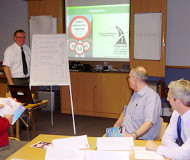5/17/2018
UK Study: Traffic School Has No Safety BenefitUK Department for Transport study concludes there is no statistically significant evidence that traffic school reduces accidents.

Sending motorists to traffic school to avoid expensive points against their licenses does nothing for traffic safety, according to a report released on Monday by the UK Department for Transport. The National Speed Awareness Course (NSAC) in Great Britain has become a major source of revenue for local police and the former police officers who split the £100 (US $135) fees paid by those seeking to save their licenses by sitting through a four hour lecture. The new study asked how the course had impacted those who did so.
Researchers with Ipsos Mori and the University of Leeds looked at the accident records and ticket history of 1.4 million attendees. The results show a short-term reduction in the number of fixed penalty notices -- traffic tickets -- received that dwindled to six percent after three years after taking the course. That did not translate into a reduction in accidents.
"This study did not find that participation in NSAC had a statistically significant effect on the number or severity of injury collisions (though some results were on the border of statistical significance) relative to a fixed penalty notice," the researchers concluded. "The data showed that injury collisions were rare amongst both participants and non-participants in NSAC."
The vast majority of those taking the course -- 78 percent -- were ticketed for driving 10 MPH or less over the speed limit, and nearly all of them had a clean record with zero points prior to receiving the ticket. The data show that these low-level offenders were just about as likely to be involved in a collision as the ticket recipients who decided not to take the course.
"As the Alliance of British Drivers has repeatedly said, this unethical and legally dubious diversion of drivers to speed awareness courses is primarily about generating money, not about road safety because there is no evidence of any real benefit," ABD spokesman Roger Lawson said in a statement.
Last year, 1,195,356 drivers completed the National Speed Awareness Course and another 218,242 took courses from other providers. That generated £63,611,910 (US $85,805,151) in profit for local police and even more for the private companies that run the courses under an umbrella organization founded by former chief constable Meredydd Hughes who was notorious for advocating the placement of a speed camera "every 400 yards on the motorway."
The researchers also found that the courses were effective at retraining participants away from "misplaced opinions" about speed cameras.
"Participation in the course, however, informed drivers as to how camera locations are selected and what their purpose is, thus contributing towards legitimizing their use and dispelling some misplaced opinions," the report noted. "Overall, the evidence suggests that the course was effective at reinforcing some participants' pre-held beliefs that speed enforcement was desirable."
A copy of the study is available in a 1.4mb PDF file at the source link below.


